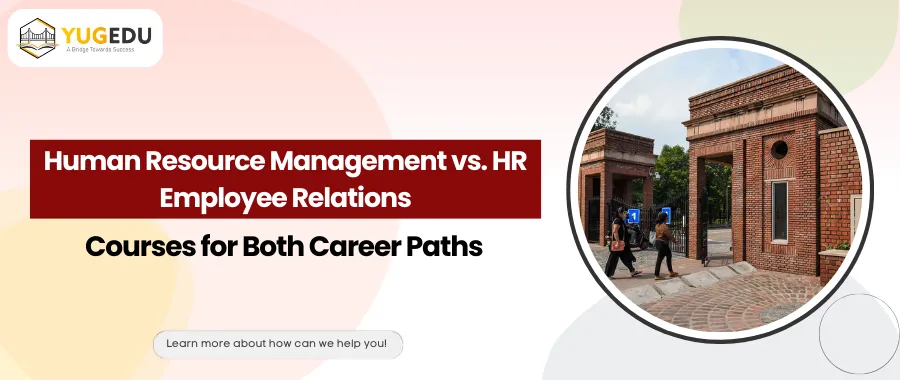
Human Resource Management vs. HR Employee Relations: Courses for Both Career Paths
While developing a career in Human Resources (HR), most HR professionals are confused between two very related but different fields Human Resource Management (HRM) and HR Employee Relations. Both are important roles in the business world, but they have different sets of responsibilities, objectives, and the type of expertise needed.
Whether you are a new graduate looking into HR jobs or an existing professional looking to upskill, knowing the difference between these two options can assist you in making a wiser career choice. In this blog, we will discuss both fields and recommend courses specific to each.
What is Human Resource Management (HRM)
Human Resource Management is a broad discipline that covers all aspects of managing the workforce in an organization. It includes recruiting, onboarding, training, compensation, performance management, policy-making, and organizational development. Human Resource Management (HRM) professionals play a key role in shaping and maintaining a company’s workforce. From hiring the right talent to ensuring employee satisfaction, HRM covers a wide range of functions. Some of the common roles in this domain include HR Generalist, Talent Acquisition Specialist, HR Manager, Learning and Development Executive, and Compensation & Benefits Analyst.
These professionals are responsible for workforce planning, recruitment, onboarding, managing employee training programs, handling payroll and benefits, drafting HR policies, and ensuring compliance with labour laws. They also focus on building a healthy work culture, conducting performance reviews, and supporting the organization’s strategic goals through effective people management.
What is HR Employee Relations?
HR Employee Relations is a specific field of HR that deals specifically with the employer-employee relationship. It entails keeping the workplace a positive place, resolving disputes, addressing grievances, and providing equal treatment in the workplace.
HR Employee Relations focuses on maintaining a harmonious work environment by managing the relationship between employees and the organization. Professionals in this field typically work in roles such as Employee Relations Specialist, Labor Relations Officer, Industrial Relations Executive, or HR Business Partner with a focus on employee relations. Their responsibilities revolve around resolving workplace conflicts, addressing employee grievances, and handling disciplinary procedures with fairness and compliance. They also ensure that the company adheres to labour laws and workplace regulations. Beyond compliance, employee relations professionals work proactively to foster engagement, boost morale, and strengthen communication between staff and management ultimately creating a positive and productive workplace culture.
Key Differences Between HRM and HR Employee Relations
Here are the key differences between HRM and HR Employee Relations
Courses for Human Resource Management Career Path
- Bachelor of Business Administration (BBA) in HR
- Master of Business Administration (MBA) in HR\
- Master of Arts in Human Resource Management
- Postgraduate diploma in human resource management
- SHRM-CP Certification (SHRM)
- Attracting Top Talent (HRCI)
- Diversity, Equity, Inclusion, and Belonging Certificate Program (AIHR)
- Pay Equity Certificate (HRPA)
- Level 3 Foundation Certificate in People Practice (CIPD)
Courses for HR Employee Relations Career Path
- Diploma in Employee Relations and Industrial Laws
- Certificate in Conflict Resolution and Negotiation Skills
- Master’s in Labor and Industrial Relations
- Specialized HR Compliance Courses
Which Career Path is Right for You?
- Choose Human Resource Management if you are good at multitasking, strategizing, and managing the overall HR function of an organization.
- Choose HR Employee Relations if you're a good listener, problem-solver, and passionate about ensuring employee well-being.
Career Scopes After Human Resource Management (HRM)
Here’s a list of career scopes after Human Resource Management (HRM) along with their average salary range in India:
Career Scopes After HR Employee Relations
Here are some popular career scopes after specializing in HR Employee Relations, along with their average salary ranges in India:
Top Indian Universities Offering HRM Courses
- XLRI – Xavier School of Management (PGDM in Human Resource Management)
- Tata Institute of Social Sciences (TISS), Mumbai
- Symbiosis Institute of Business Management (SIBM) – MBA in HRM
- Narsee Monjee Institute of Management Studies (NMIMS) – Online & On-campus
- IGNOU – Indira Gandhi National Open University (MBA in HRM – Distance)
- Amity University Online – MBA in HRM
- Manipal University Jaipur (Online) – MBA in HRM
- Jain University Online – MBA in HRM
- ICFAI University – MBA in HRM (Online & Distance)
- Chandigarh University Online – MBA in HRM
Universities Offering Courses in HR Employee Relations
- XLRI – Xavier School of Management (PGDM in HRM)
- Tata Institute of Social Sciences (TISS), Mumbai
- Symbiosis Centre for Distance Learning (SCDL)
- IGNOU – Indira Gandhi National Open University
- Amity University Online
- Jain University Online
- Manipal University Jaipur (Online)
- Narsee Monjee Institute of Management Studies (NMIMS) – Online
- University of Illinois
- University of London
Conclusion
Whether you choose Human Resource Management or HR Employee Relations, both fields offer strong career prospects and are vital to organizational success. Your choice depends on your strengths—whether you're strategic and process-driven or more focused on people and workplace harmony. Choose the right course and university that aligns with your career goals.





